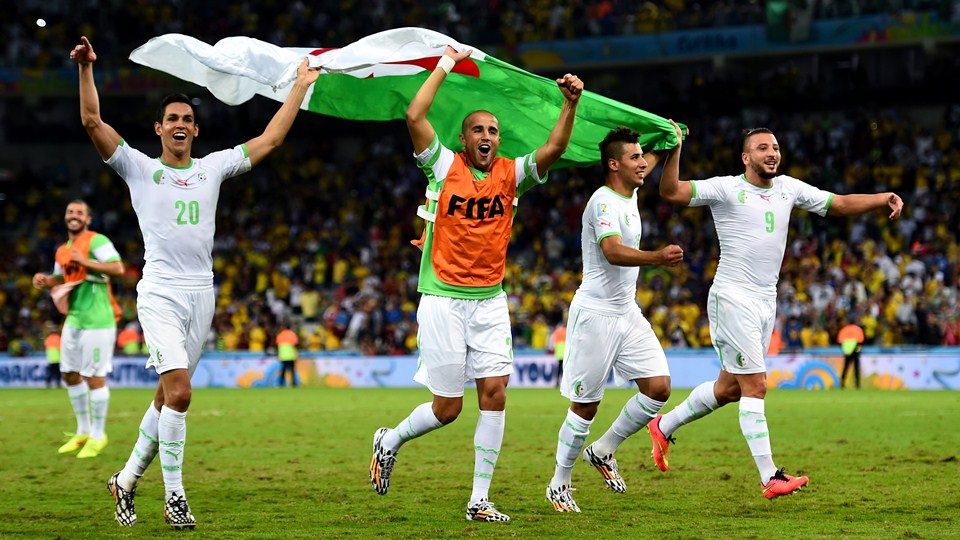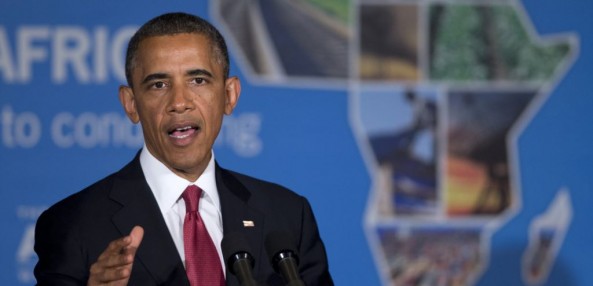This week, soccer teams from 16 countries advanced to the sudden death round of the World Cup. During each game, a combination of a team’s individual skills, focus, and their ability to function as a team will determine whether they succeed or fail, whether they go home early, or lift the cup on July 13th and become heroes at home.
So far during this year’s cup, teams from smaller countries not typically granted the same influence on the global stage are demanding equality and respect on the playing field. Countries such as Costa Rica, Ghana, Algeria, and Iran have shown the world that they have what it takes to challenge the world powers on the soccer pitch on equal terms.
And yet, power asymmetries still persist on the field: Algeria and Nigeria are the only two Africa nations to advance to the 16 round, as Germany, France, Belgium, Switzerland, the Netherlands, Greece, and (perhaps most surprisingly) the United States move forward.

Algerian national team members celebrate qualifying for the knock out stage after the 1-1 draw in the 2014 FIFA World Cup match against Russia in Curitiba, Brazil. (Photo by Shaun Botterill - FIFA/FIFA via Getty Images)
As the world turns its attention to the global power plays currently playing out in stadiums across Brazil, such circumstances present a unique opportunity to reflect on ways that sustainable approaches to global engagement can mitigate this persistent asymmetry in the global political and economic arena.
The Future of Effective Collaboration in Africa
Later this summer, the United States will host the leaders of 47 African nations at the U.S.-Africa Leaders Summit, a forum that will facilitate strategic discussions on the critical challenges and opportunities ahead in development, trade, and international security. The two-day event, scheduled for August 5-6, 2014 in Washington D.C., will empower Africa’s leaders to raise their voices and articulate a new strategy for engagement on the continent.

During his second official trip to sub-Saharan Africa in 2013, President Obama announced that he would be hosting the U.S.-Africa Leaders Summit in 2014.
Many experts have already begun to offer their recommendations for how American and African leaders alike can best realize gains from the upcoming dialogue. While the public and private sector are open to a more collaborative approach moving forward, advances will only be achieved if African leaders arrive prepared to offer a coherent plan and clear objectives that will permit rapid and effective engagement by interested parties within the U.S. government and the corporate community.
One such collaborative way of strengthening the relationship between the United States and Africa is through a greater emphasis on local content development policies and practice. Dr. Michael Warner of LCS broadly defines local or national content as “the participation and development of national capital, labor, technology, goods and services in the planning and execution of oil, gas, and mineral exploration, development, and production.” This increasingly popular practice area seeks to deliver greater local benefits from new resource discovery and extraction by International Oil Companies (IOCs) by ensuring at least some contracts remain within the local business community. Countries with significant petroleum deposits, such as Nigeria, Indonesia, and Brazil, have all made strides to ensure that benefits are distributed locally, though their good intentions typically result in strict legislation that responds more to political initiatives than realistic expectations.
According to Harry Pastuszek, Vice President of Economic and Community Development at PYXERA Global, finding the right balance can be difficult. “The tendency of international oil companies (commonly known as IOCs), to work with foreign suppliers and contractors is driven by more than a blind unwillingness to work with locals—finding qualified and competent local suppliers is more difficult than simply issuing an invitation to tender in the local language,” said Pastuszek.
While remaining within the boundaries of regulatory trade frameworks, the ability of countries with great natural resources to develop their emerging industry base can go a long way toward combating the natural resource curse. Further investment in the development of national capital, labor, goods and services is essential in moving nations beyond commodity exporting economies.
Natural Resource Blessing or Curse?
For decades, the development community has embraced the expected de facto downside of natural resource discovery in emerging markets, for the benefit of greater economic growth. A combination of conflict, corruption, and weak public institutions has often meant that the dividends accrue elsewhere.
In Mozambique, one of the most natural resource rich countries in the world, this has been the case for decades. A long line of multinational corporations seeking coal, aluminum, tin, and other precious metals and gemstones have extracted a great deal of natural wealth, leaving limited economic gains in their wake. Over the past three years, American firm Anadarko and Italian giant ENI have both reported discoveries of massive deposits of offshore gas, ensuring that Mozambique will soon become one of the world’s top natural gas exporting countries.

Over the past three years, discoveries of massive deposits of offshore gas have ensured that Mozambique will become one of the world’s top natural gas exporting countries. Photo courtesy of Anadarko.
One IOC has embraced an innovative and progressive view of the economic growth and development gains they hope the extraction project will enable. In partnership with our team at PYXERA Global, the company is seeking to engage a growing supply chain of local vendors able to meet the procurement demands of the project, acknowledging that the greatest game-changing opportunities often exist in the early Front-End Engineering and Design or FEED phase of the project.
At PYXERA Global, our team is engaging the private sector and governments throughout Africa, leading the way in national content development surrounding the extractive industry. Partnerships forged in the natural gas industry are a key way of paving a pathway for sustainable economic growth and leveling the playing field. By strengthening national industry, local enterprises will become more competitive, enabling them to provide better livelihoods to local communities. These gains are already being realized in Mozambique, but the opportunities for similar interventions in countries across the African continent are almost endless.
Bringing Home the Gold
On June 30, Nigeria will face off against France in Brasilia for the chance to proceed to the World Cup round of 8. Yet, the odds are against them; in the tournament’s history, only three African teams have moved on to the Round of 8. Still, many in sub-Saharan Africa will be sporting their African pride and many more around the world will be rooting for the underdog, even against the odds. Though many countries have proudly and honorably defended their national pride on the pitch, in the Round of 16, many expect the world powers will once again gain the upper hand.
Nigeria, a country rich in natural resources—especially oil—has struggled for decades to successfully establish local content policies and programs that effectively deliver financial returns to those who need it most. When U.S. and African leaders convene to discuss prospective partnerships, the significant potential economic gains of effective local content development should not be lost among the many important topics that need to be addressed. Nigeria is sure to be among the delegations most actively engaged in the August summit, and their approach to local content is worthy of scrutiny and reflection. African leaders will come to Washington expecting a new engagement strategy, one in which they’re not simply reduced to supplying commodities and receiving aid, but instead, a strategy that values collaborative partnerships on an equal playing field. With the right planning, they can ensure that nobody goes home with a loss, instead emboldened by a message of hope, and a clearly defined ground-breaking path toward economic sustainability.
Feature photo: Ahmed Musa of Nigeria celebrates scoring his team’s second goal with teammates during the 2014 FIFA World Cup matchagainst Argentina. (Photo by Paul Gilham/Getty Images)
Daniel Breneman
Daniel is a Program Manager for the Enterprise and Community Development Practice Area at PYXERA Global where he assists in the development of local content programs. Daniel has been involved in headquarters and field program management activities for non-profit organizations over the past decade, in both Latin America and Africa. Daniel grew up in Argentina, and is fluent in Spanish and Portuguese.




